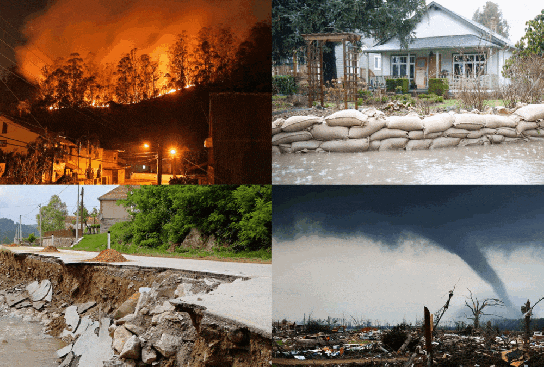
When He opened the third seal, I heard the third living creature say, “Come!” And I looked, and there was a black horse. The horseman on it had a set of scales in his hand. Then I heard something like a voice among the four living creatures say, “A quart of wheat for a denarius, and three quarts of barley for a denarius—but do not harm the olive oil and the wine.” (Revelation 6:5-6)
If my people, which are called by my name, shall humble themselves, and pray, and seek my face, and turn from their wicked ways; then will I hear from heaven, and will forgive their sin, and will heal their land. (2 Chronicles 7:14)
.
Extreme weather impacts swaths of the US CNN, March 1, 2024
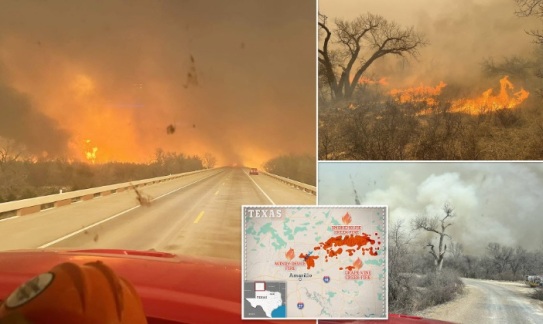
A blockbuster California storm is set to unload up to 10 feet of snow and blizzard conditions in parts of the state through the weekend. The storm will bury California under its biggest snowfall of the year and create treacherous travel conditions, with up to 5 inches of snow an hour expected along the Sierra Nevada mountains. The most extreme conditions will unfold at the highest elevations in the Sierra, with wind gusts in excess of 100 mph. Meanwhile, Texas is bracing for more dry air and ferocious winds today and into the weekend — likely fueling the flames of several wildfires in the region. The deadly Smokehouse Creek Fire has torched more than 1 million acres in Texas alone, making it the largest fire on record in the state.
.
What are the odds that extreme weather will lead to a global food shock? Yale Climate Connections, January 25, 2024
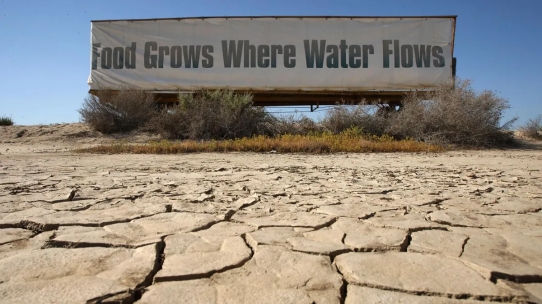
Envision, for a moment, a multiyear period of extreme weather, including heat waves, freezes, droughts, floods, and windstorms, topped off by extreme weather during an El Niño event, leading to major crop failures in the U.S.
A disruption of the global agricultural and food supply chain results, leading to panic buying and price shocks. Water shortages cause significant social disruption as populations vie for limited vital resources. The number of countries able to maintain a sustainable level of output shrinks dramatically, the global economy contracts at an accelerating pace, and political tensions rise as countries look to maintain food security. Trade disputes, increased competition and inequality, social unrest, and crime increase, causing widespread business interruption, falling profits, and layoffs, primarily in the agricultural and agriculture-dependent industries.
A 2023 report by insurance giant Lloyd’s explores the odds of such a scenario, using weather data from the past 40 years and a crop model combined with a water-stress model to measure the economic impact of a sustained period of extreme weather.
Drought is the great enemy of human civilization, for it deprives us of the two essentials of life — food and water. When the rains stop and the soil dries up, cities can die and civilizations collapse, as people abandon lands no longer able to sustain them. Drought has been identified as the primary or significant contributing factor in the collapse of a surprising number of great civilizations in the past. As I wrote recently in a two-part series on climate change and agriculture, increased drought and extreme heat adversely affecting agriculture likely pose the highest threat to civilization over the next 40 years, as droughts increase in duration, areal coverage, and intensity.
Extreme droughts can affect multiple grain-growing areas simultaneously, causing “food shock” events that could trigger food-price spikes leading to mass starvation, war, and a severe global economic recession. Human-caused climate change is hiking the risk of such simultaneous droughts and their associated heat waves, which have seen a steady increase in recent years because of climate change (Figure 3).
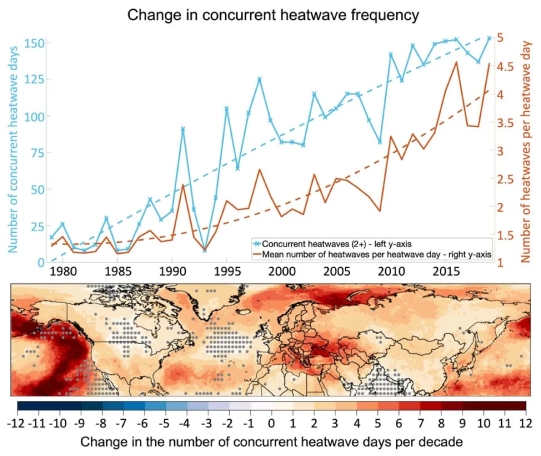
And the odds of a globally disruptive extreme food shock event are steadily increasing as humans burn fossil fuels and pump more heat-trapping climate pollutants into the air.
Given the unprecedented surge in global temperatures over the past year, combined with ongoing disruptions to the food system from the COVID-19 pandemic and the war in Ukraine, the odds of a Lloyd’s food-shock scenario will be higher than usual in 2024.
In addition, the odds of simultaneous droughts hitting major grain-producing regions are higher during El Niño years, such as the one we are currently experiencing — though El Niño is expected to wane by summer, according to the latest outlook from NOAA. Historically, about 46% of concurrent droughts occur during El Niño events, and 22% occur during La Niña events.
The Coming Famine
In recent years, the specter of climate change has moved from a distant threat to an immediate crisis, with its effects being felt across the globe. At the forefront of this crisis is the increasing risk of global famine, a potential catastrophe that could affect millions of lives. Climate change, predominantly driven by human activities such as fossil fuel combustion, deforestation, and industrial farming, is drastically altering the Earth’s climate system. This alteration manifests in several critical ways that directly threaten global food security.
Alteration of Weather Patterns
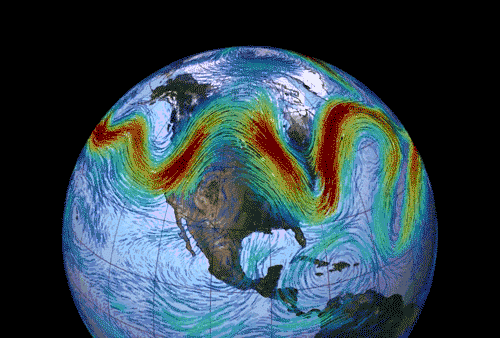
One of the most significant impacts of climate change is the alteration of historical weather patterns. These changes are not merely statistical anomalies but represent a fundamental shift in the climatic conditions that underpin global agriculture. Regions that have been agricultural powerhouses for centuries are now facing unprecedented challenges.
For example, the predictable seasonal cycles essential for farming are becoming more erratic. Spring may arrive earlier or later than usual, throwing off planting schedules. Summers are increasingly hotter and, in many areas, drier. These extreme conditions stress crops, reduce yields, and in some cases, lead to total crop failure. Conversely, some regions are experiencing increased rainfall leading to flooding, which can be just as devastating to agricultural productivity as drought.
Exacerbation of Natural Disasters
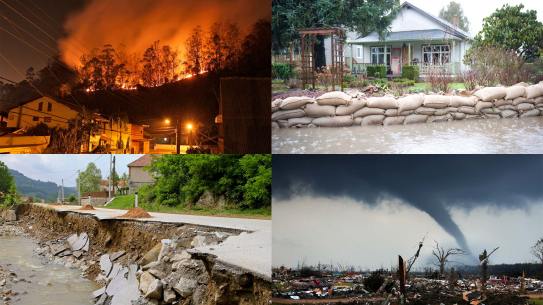
Climate change is also leading to an increase in the frequency and severity of natural disasters such as hurricanes, floods, wildfires, and droughts. These events can have immediate and catastrophic impacts on agriculture. A single storm or flood can wipe out entire harvests, decimate livestock, and ruin soil. Droughts, which are becoming more common and prolonged in many parts of the world, directly affect crop and livestock productivity. Wildfires, intensified by dry conditions, not only destroy vegetation but also affect air quality and soil health, further compromising agricultural output.
Impact on Agricultural Productivity
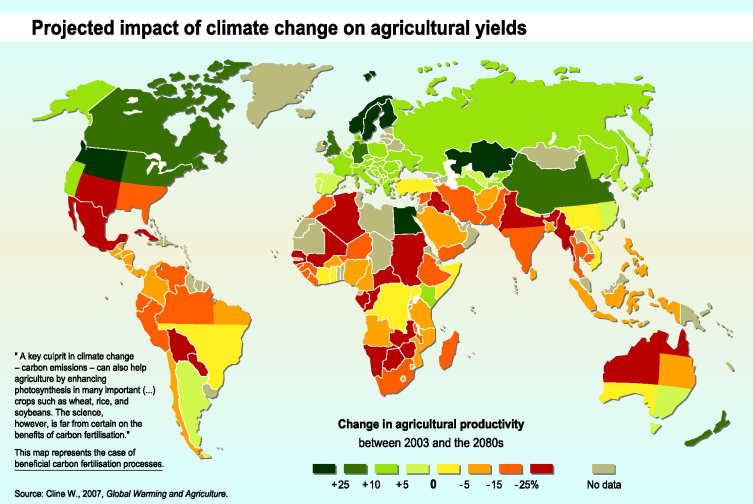
The overarching effect of these climatic changes is a significant impact on agricultural productivity. Crops and livestock are highly sensitive to changes in temperature and precipitation. As such, the shifting climate is affecting what can be grown and raised in various parts of the world. Traditional farming areas may no longer be suitable for the crops or livestock they have historically supported, forcing a shift in agricultural practices, crop types, and even the relocation of farming activities.
Moreover, climate change is also contributing to the spread of pests and diseases, both plant and animal, into new regions. These pests and diseases find favorable conditions in the altered climates, further threatening agricultural productivity.
Expanding on the impact of climate change on agriculture, we can delve deeper into each of the three areas mentioned:
Droughts and Heatwaves
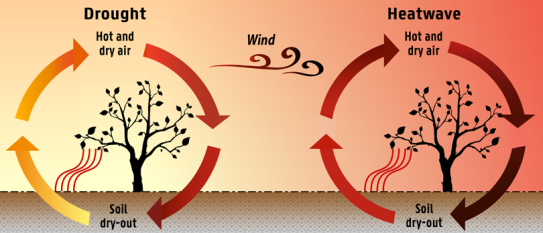
The phenomenon of prolonged droughts and intense heatwaves is becoming increasingly common, with major agricultural regions around the world feeling the brunt. For instance, the Midwest of the United States, known as the “breadbasket” of the country, has experienced severe droughts in recent years. These droughts have led to reduced soil moisture and water availability, crucial for crops like corn and soybeans. The result is a significant drop in crop yields, which not only affects local food supply but also global food markets, given the role of the U.S. in global food exports.
Similarly, parts of Europe have faced unprecedented heatwaves, affecting the productivity of crops and livestock. Vineyards in France, wheat fields in Germany, and olive groves in Italy have all reported reduced yields due to extreme temperatures. These conditions stress plants, lead to faster evaporation of water, and sometimes even cause direct damage to crops. Moreover, heat stress can lead to reduced fertility in livestock, affecting meat and dairy production.
Unpredictable Rainfall Patterns
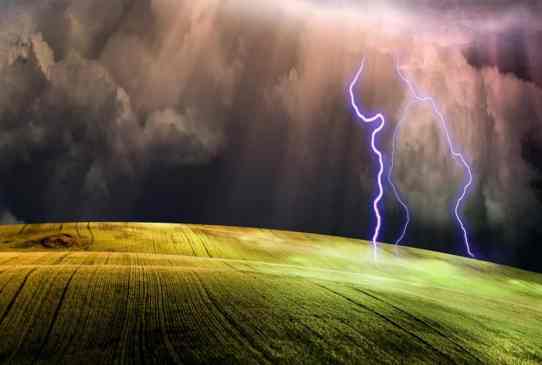
Changes in rainfall patterns, characterized by unexpected dry spells and extreme flooding, are another critical impact of climate change on agriculture. In regions such as Southeast Asia and parts of Africa, where agriculture heavily depends on the monsoon season, the unpredictability of monsoons poses a severe risk. For example, rice paddies require specific water conditions, and any deviation can significantly reduce yields. Delayed monsoons can disrupt the planting season, while unexpected heavy rains can flood fields and damage crops.
In Africa, farmers who depend on regular rain patterns for their crops are facing challenges due to these changes. Unpredictable rainfall leads to periods of drought interspersed with intense floods, both of which are detrimental to farming. This unpredictability makes it difficult for farmers to plan their planting and harvesting, leading to reduced yields and food insecurity.
Pest and Disease Proliferation
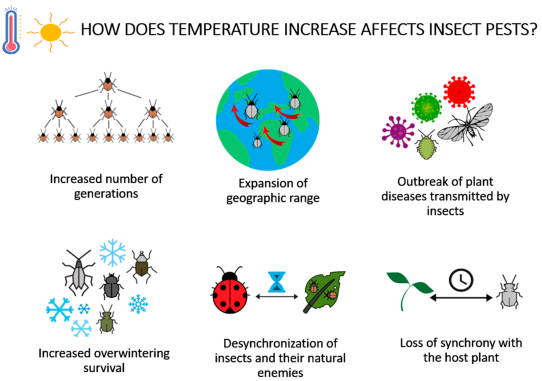
Warmer temperatures are also causing the proliferation of pests and diseases, a trend with significant implications for global agriculture. Pests and diseases that were once confined to tropical areas are now being seen in more temperate regions. For instance, the spread of the fall armyworm in Africa and Asia has caused significant damage to crops like maize, a staple food in many countries.
Crops are not the only victims; livestock are also at risk. Warmer temperatures and increased humidity create conditions conducive to diseases in animals. For example, cattle in some regions are increasingly exposed to diseases like bluetongue and tick-borne illnesses.
Moreover, the spread of plant diseases is not just a local issue. Global trade means that plant pathogens can quickly spread from one region to another, posing a threat to global food security. The impact is not only on the quantity of food produced but also on its quality, as diseases can reduce the nutritional value of crops.
.
Healing the Land?
The verse 2 Chronicles 7:14 stands as a pivotal moment in the Old Testament, nestled within a narrative of great significance. This scripture emerges at a time when King Solomon had just completed the construction of the Temple in Jerusalem, a monumental feat that not only represented the physical embodiment of Israel’s worship but also symbolized the nation’s deep relationship with God. The temple’s dedication was marked by grand ceremonies, fervent prayers, and sacrificial offerings, reflecting Israel’s devotion to their God.
In this context, 2 Chronicles 7:14 is part of God’s response to Solomon’s prayer of dedication. It is a divine promise, laden with conditions and hope. The Lord says, “If my people, who are called by my name, will humble themselves and pray and seek my face and turn from their wicked ways, then I will hear from heaven, and I will forgive their sin and will heal their land.” This verse is not merely a response to Solomon but a timeless covenant, offering guidance for reconciliation between God and His people and the healing of their land.
The promise in this scripture is multifaceted. It speaks of humility, prayer, seeking God, and repentance. It is an acknowledgment that the spiritual state of the people directly impacts their physical reality. The healing of the land, referenced here, can be interpreted both literally and metaphorically, encompassing everything from agricultural bounty to societal and spiritual restoration.
Today, nations across the globe face multifarious challenges, some of which bear a striking resemblance to the conditions addressed in 2 Chronicles 7:14. Among these challenges is the looming threat of famine, exacerbated by factors such as climate change, environmental degradation, and socio-political conflicts. These issues, much like in Solomon’s time, call for a deep examination of our collective actions and attitudes.
.
How can we have abundant life in the midst of the global famine that is to come?
A thief comes only to steal and to kill and to destroy. I have come so that they may have life and have it in abundance. (John 10:10)
This word “abundant” in the Greek is perisson, meaning “exceedingly, very highly, beyond measure, more, superfluous, a quantity so abundant as to be considerably more than what one would expect or anticipate.” In short, Jesus promises us a life far better than we could ever imagine, a concept reminiscent of 1 Corinthians 2:9:
But as it is written:
What eye did not see and ear did not hear,
and what never entered the human mind—
God prepared this for those who love Him.
The apostle Paul tells us that God is able to do exceedingly abundantly above all that we ask or think, and He does it by His power, a power that is at work within us if we belong to Him.
How do we obtain this abundant life?

Before we begin to have visions of lavish homes, expensive cars, worldwide cruises, and more money than we know what to do with, we need to pause and think about what Jesus teaches regarding this abundant life.
The Bible tells us that wealth, prestige, position, and power in this world are not God’s priorities for us:
Brothers, consider your calling: Not many are wise from a human perspective, not many powerful, not many of noble birth. Instead, God has chosen what is foolish in the world to shame the wise, and God has chosen what is weak in the world to shame the strong. God has chosen what is insignificant and despised in the world—what is viewed as nothing—to bring to nothing what is viewed as something, so that no one can boast in His presence. (1 Corinthians 1:26-29).
In terms of economic, academic, and social status, most Christians do not come from the privileged classes. Clearly, then, abundant life does not consist of an abundance of material things. If that were the case, Jesus would have been the wealthiest of men. But just the opposite is true:
Jesus told him, “Foxes have dens and birds of the sky have nests, but the Son of Man has no place to lay His head.” (Matthew 8:20).
So, how did Jesus illustrate abundant life?
After this, Jesus crossed the Sea of Galilee (or Tiberias). And a huge crowd was following Him because they saw the signs that He was performing by healing the sick. So Jesus went up a mountain and sat down there with His disciples.
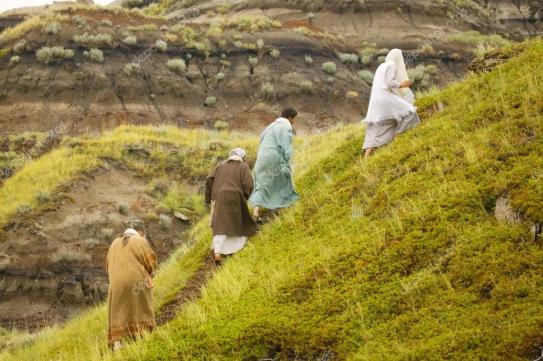
Now the Passover, a Jewish festival, was near. Therefore, when Jesus looked up and noticed a huge crowd coming toward Him, He asked Philip, “Where will we buy bread so these people can eat?” He asked this to test him, for He Himself knew what He was going to do.
Philip answered, “Two hundred denarii worth of bread wouldn’t be enough for each of them to have a little.”
One of His disciples, Andrew, Simon Peter’s brother, said to Him, “There’s a boy here who has five barley loaves and two fish—but what are they for so many?”
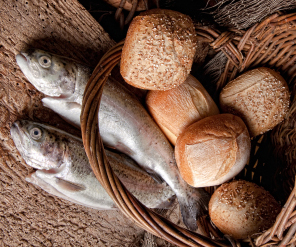
Then Jesus said, “Have the people sit down.”
There was plenty of grass in that place, so they sat down. The men numbered about 5,000. Then Jesus took the loaves, and after giving thanks He distributed them to those who were seated—so also with the fish, as much as they wanted.
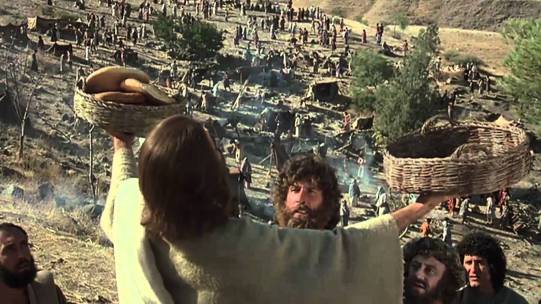
When they were full, He told His disciples, “Collect the leftovers so that nothing is wasted.” So they collected them and filled 12 baskets with the pieces from the five barley loaves that were left over by those who had eaten. (John 6:1-13)
But the crowds completely misunderstood the purpose of His miracle of multiplication:
Jesus answered, “I assure you: You are looking for Me, not because you saw the signs, but because you ate the loaves and were filled. Don’t work for the food that perishes but for the food that lasts for eternal life, which the Son of Man will give you, because God the Father has set His seal of approval on Him.”
“What can we do to perform the works of God?” they asked.
Jesus replied, “This is the work of God—that you believe in the One He has sent.”
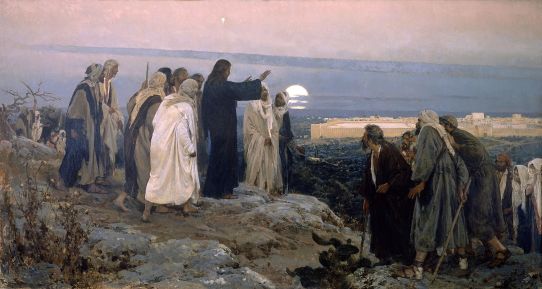
“What sign then are You going to do so we may see and believe You?” they asked. “What are You going to perform? Our fathers ate the manna in the wilderness, just as it is written: He gave them bread from heaven to eat.”
Jesus said to them, “I assure you: Moses didn’t give you the bread from heaven, but My Father gives you the real bread from heaven. For the bread of God is the One who comes down from heaven and gives life to the world.”
Then they said, “Sir, give us this bread always!”
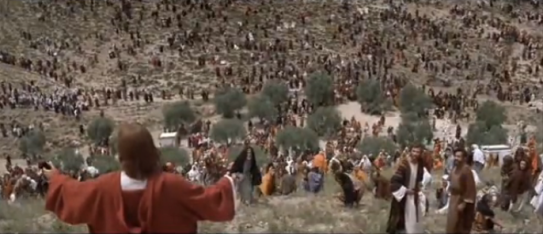
“I am the bread of life,” Jesus told them. “No one who comes to Me will ever be hungry, and no one who believes in Me will ever be thirsty again. But as I told you, you’ve seen Me, and yet you do not believe. Everyone the Father gives Me will come to Me, and the one who comes to Me I will never cast out. For I have come down from heaven, not to do My will, but the will of Him who sent Me. This is the will of Him who sent Me: that I should lose none of those He has given Me but should raise them up on the last day. For this is the will of My Father: that everyone who sees the Son and believes in Him may have eternal life, and I will raise him up on the last day.” (John 6:26-40)
Abundant life is eternal life, a life that begins the moment we come to Christ and receive Him as Savior, and goes on throughout all eternity.
The biblical definition of life — specifically eternal life — is provided by Jesus Himself:
This is eternal life:
that they may know You, the only true God,
and the One You have sent—Jesus Christ. (John 17:3)
Later, Jesus would institute the Lord’s Supper to remind them that He alone is the Source of abundant life:

When the hour came, He reclined at the table, and the apostles with Him. Then He said to them, “I have fervently desired to eat this Passover with you before I suffer. For I tell you, I will not eat it again until it is fulfilled in the kingdom of God.” Then He took a cup, and after giving thanks, He said, “Take this and share it among yourselves. For I tell you, from now on I will not drink of the fruit of the vine until the kingdom of God comes.”
And He took bread, gave thanks, broke it, gave it to them, and said, “This is My body, which is given for you. Do this in remembrance of Me.”

In the same way He also took the cup after supper and said, “This cup is the new covenant established by My blood; it is shed for you. (Luke 22:14-20)
We naturally desire material things, but as Christians our perspective on life must be revolutionized.
Just as we become new creations when we come to Christ, so must our understanding of “abundance” be transformed.
True abundant life consists of an abundance of love, joy, peace, and the rest of the fruits of the Spirit, not an abundance of “stuff.” It consists of life that is eternal, and, therefore, our interest is in the eternal, not the temporal. Paul admonishes us:
Set your minds on what is above, not on what is on the earth. For you have died, and your life is hidden with the Messiah in God. (Colossians 3:2-3)..
.
Many of the people who are now suffering through these hard times are Christians. Shouldn’t fully-devoted followers of Jesus Christ be free of poverty and hunger?
Prosperity theology (sometimes referred to as the prosperity gospel, the health and wealth gospel, the gospel of success, or seed faith) is a religious belief among some Protestant Christians that financial blessing and physical well-being are always the will of God for them, and that faith, positive speech, and donations to religious causes will increase one’s material wealth.

Prosperity theology has been criticized by leaders from various Christian denominations, including within some Pentecostal and charismatic movements, who maintain that it is irresponsible, promotes idolatry, and is contrary to the scripture. Secular as well as some Christian observers have also criticized prosperity theology as exploitative of the poor. The practices of some preachers have attracted scandal and some have been charged with financial fraud.

Prosperity theology views the Bible as a contract between God and humans: if humans have faith in God, he will deliver security and prosperity. The doctrine emphasizes the importance of personal empowerment, proposing that it is God’s will for his people to be blessed. The atonement (reconciliation with God) is interpreted to include the alleviation of sickness and poverty, which are viewed as curses to be broken by faith. This is believed to be achieved through donations of money, visualization, and positive confession.

It was during the Healing Revivals of the 1950s that prosperity theology first came to prominence in the United States, although commentators have linked the origins of its theology to the New Thought movement which began in the 19th century. The prosperity teaching later figured prominently in the Word of Faith movement and 1980s televangelism. In the 1990s and 2000s, it was adopted by influential leaders in the Pentecostal movement and charismatic movement in the United States and has spread throughout the world.

.
What does the Holy Bible say about it?
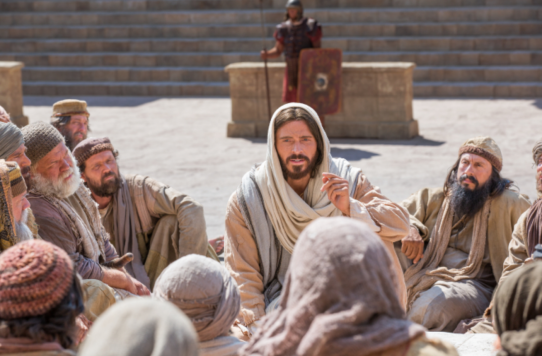
So don’t worry, saying, ‘What will we eat?’ or ‘What will we drink?’ or ‘What will we wear?’ For the idolaters eagerly seek all these things, and your heavenly Father knows that you need them. But seek first the kingdom of God and His righteousness, and all these things will be provided for you. (Matthew 6:31-33)
Mainstream evangelicalism has consistently opposed prosperity theology as heretical, and prosperity ministries have frequently come into conflict with other Christian groups, including those within the Pentecostal and Charismatic movements. Critics of the movement assail promises made by its leaders, arguing that the broad freedom from problems they promise is irresponsible.
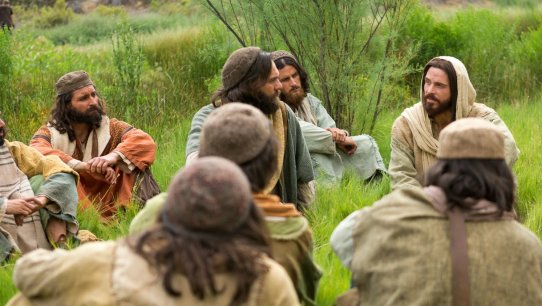
I have told you these things so that in Me you may have peace. You will have suffering in this world. Be courageous! I have conquered the world. (John 16:33)
Prosperity theology has been opposed for not adequately explaining the poverty of the Apostles. For instance, some theologians believe that the life and writings of Paul the Apostle, who is believed to have experienced significant suffering during his ministry, are particularly in conflict with prosperity theology.
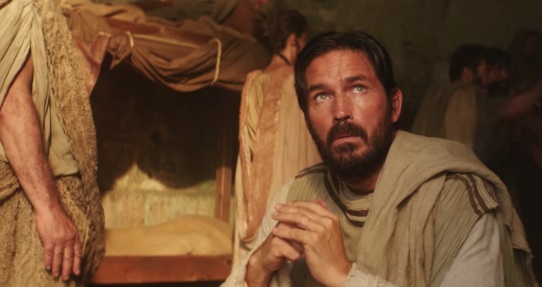
We give no opportunity for stumbling to anyone, so that the ministry will not be blamed. But as God’s ministers, we commend ourselves in everything:
by great endurance, by afflictions,
by hardship, by difficulties,
by beatings, by imprisonments,
by riots, by labors,
by sleepless nights, by times of hunger,
by purity, by knowledge,
by patience, by kindness,
by the Holy Spirit, by sincere love,
by the message of truth,
by the power of God;
through weapons of righteousness
on the right hand and the left,
through glory and dishonor,
through slander and good report;
as deceivers yet true;
as unknown yet recognized;
as dying and look—we live;
as being disciplined yet not killed;
as grieving yet always rejoicing;
as poor yet enriching many;
as having nothing yet possessing everything. (2 Corinthians 6:3-10)
.
In fact, the history of Christianity is not of prosperity, but of martyrs, according to the Bible.
It begins in Acts with the stoning of the apostle Stephen. Later in the book of Acts, the apostle Paul calls Stephen Jesus’ martyr. It says in Acts 22:20, “And when the blood of your martyr Stephen was shed, I stood there giving my approval and guarding the clothes of those who were killing him.”
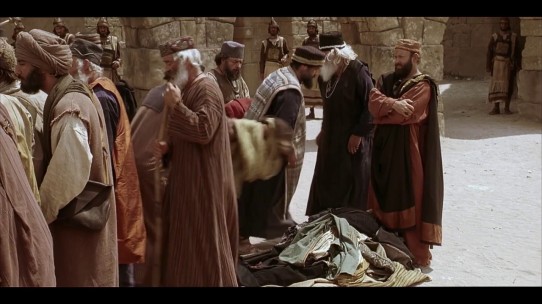
However, the history of Christian martyrs does not end with Stephen’s death. During the first century after Jesus’ death nearly all of his disciples suffered martyrdom for His sake. James the son of Zebedee was beheaded in approximately 44 A.D. Philip was crucified in 54 A.D. Matthew was killed with a halberd, an ax-like weapon, in 60 A.D. James, who is thought to be the brother of Jesus, was beaten to death, Matthias was beheaded, Andrew was crucified, Mark was torn to pieces, and Peter was crucified upside down. Jude, Bartholomew, and Thomas were also martyred. Paul suffered martyrdom in Rome where he was beheaded. Other early apostles Luke, Barnabas, Timothy, and Simon were also killed for the sake of Christ.
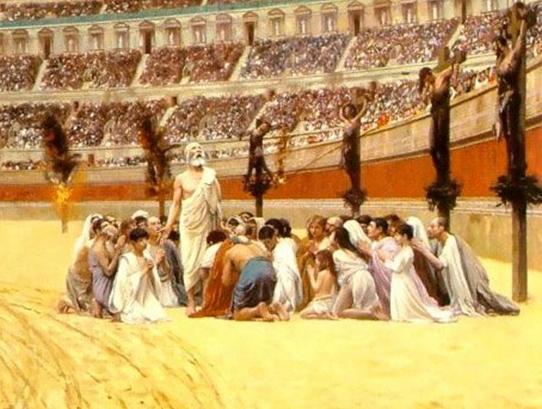
The history of Christian martyrs does not end with the death of the disciples. Thousands willingly gave their lives under Roman persecution by the emperors Nero, Domitian, Trajan, Marcus Aurelius, Maximus, Decius, Valerian, Aurelian, and Diocletian. The Roman persecution lasted well into the fourth century A.D. and did not end until Emperor Constantine declared Christianity the official religion of his empire. During the same time period, in Persia, where the Gospel had quickly spread, many others were also martyred for their faith.
Unfortunately, the history of Christian martyrs does not end with Constantine. Throughout the following centuries and up until present time, Christians have, and continue to, suffer martyrdom. This persecution has come by means of other Christians, other faiths, and political powers. This martyrdom gives testimony to the verse in John 15: 20-21 where Jesus tells His disciples, “Remember the words I spoke to you: ‘No servant is greater than his master.’ If they persecuted me, they will persecute you also. If they obeyed my teaching, they will obey yours also. They will treat you this way because of my name, for they do not know the One who sent me.”
Where is our hope?
At some time in the near future, Jesus will come in the clouds with great power and glory to gather his believers into his Kingdom. Those who have already died in Christ will rise first. Then, the believers who are alive on the earth at the time of his coming will be caught up together with them in the clouds, to meet the Lord in the air.

For those who know the only true God, and Jesus Christ whom he sent, there will be no more death, no more sorrow, and no more crying or pain. God will be with his people and he will wipe away all tears from their eyes. The former things will pass away and all things will be made new. This will continue forever.
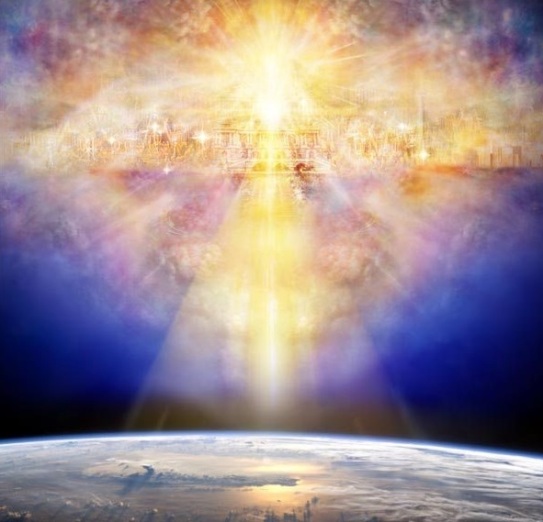
Those who continue rebelling and reject this sacrifice for their sin will remain spiritually dead for all eternity, and will be sent to the bottomless pit along with Satan and his evil angels.

Your decision – – Take this time to be guaranteed salvation and a place in heaven today. Turn from your sins and turn to God, because the Kingdom of heaven is coming. You can accept the Lord’s plan for saving you by praying like this:
Father God, I thank you that you sent your son Jesus Christ to come to earth and show us by his example how to live. I know that He was my Passover lamb – He suffered and took my rebellion and sin upon himself, and died and then rose again. I ask you Jesus to forgive my sins, help me to live for you and stop rebelling, and to be the Savior and Lord of my life. I invite you Holy Spirit to live in me and guide me away from sin and teach me the Word of God in the Bible. Amen!
.
Spread the Word:
Send any comments, suggestions, or prayer requests to raptureandendtime@gmail.com
Comment – Follow – Share!
It’s coming…
Texas Wildfire Causes ‘Catastrophic Losses’ to Cattle Herds: ‘Farmers & Ranchers Are Losing Everything’
The devasting impact of the Texas wildfires is beginning to emerge as the cattle industry braces for historic losses.
One of several wildfires raging in the Texas Panhandle has now grown to become the largest in state history.
The Smokehouse Creek fire has been burning since Monday and has so far destroyed over one million acres of land in Texas alone.
However, emergency crews have made little progress in containing it.
It has so far torched the most land than any other recorded wildfire in the history of the state.
The same blaze has also destroyed 31,500 acres in Oklahoma, according to CNN.
The Smokehouse Creek fire is just one of several that have ripped through Texas cattle country this week.
LikeLiked by 1 person